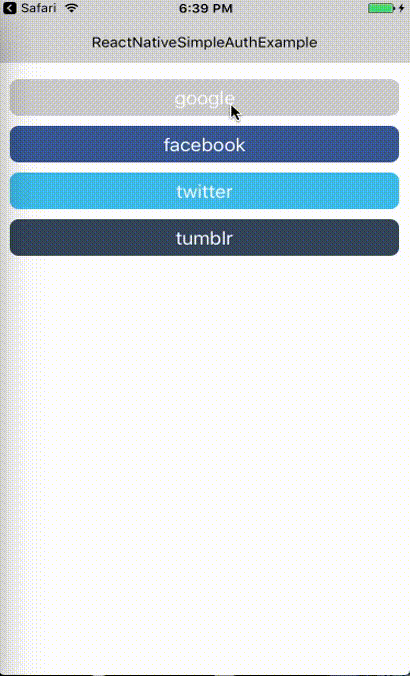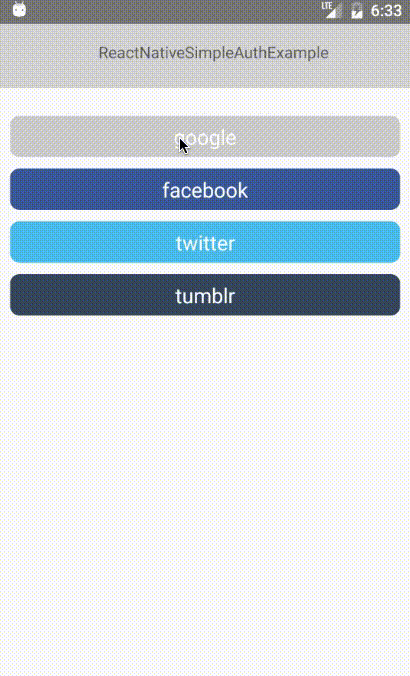@fukhaos/react-native-simple-auth
v2.6.1
Published
Native social authentication for React Native
Maintainers
Readme
react-native-simple-auth 
OAuth login for React Native
Forked from Adam Mcgrath
Changes:
- No longer gets a google token or user details. This can then be sent to a server to auth.
- Asks for offline access from google for server requests.
Screencast
iOS | Android
:-------------------------:|:-------------------------:
 |
| 
Source of example app: https://github.com/adamjmcgrath/ReactNativeSimpleAuthExample
Install
yarn add react-native-simple-auth- Set up deep linking for your Android and iOS application using the instructions on the react-native website (set the
launchModeofMainActivitytosingleTaskinAndroidManifest.xml, create the deep link schemes in Providers Setup) - Set up your OAuth Providers
Providers Setup
- Go to the developer console and create credentials for an iOS application (you can also use these for your Android app). More instructions on the Google support site.
- The "Bundle ID" should contain a dot, eg
com.reactnativesimpleauth - Your configuration object should contain the 'Client ID' as
appIdand 'Bundle ID' in thecallback(note the single/, you can put anything as the path), eg
{
appId: '123-123abc.apps.googleusercontent.com',
callback: 'com.reactnativesimpleauthexample:/oauth2redirect'
}- Add the deep link scheme for the callback (Your Bundle ID, eg
com.reactnativesimpleauthexample) to yourAndroidManifest.xmleg https://github.com/adamjmcgrath/ReactNativeSimpleAuthExample/blob/master/android/app/src/main/AndroidManifest.xml#L28-L33 - Add the deep link scheme for the callback to your iOS app, eg https://dev.twitter.com/cards/mobile/url-schemes
- Create an app on the Facebook developers website
- In
Settings, clickAdd Platform - Select iOS, and in the
Bundle IDfield, addfb{your App ID}egfb1234567890(You can use the same configuration for Android) - Your configuration object should contain the 'Appid ID' as
appIdand 'Bundle ID' in thecallback(you must put://authorize), eg
{
appId: '1234567890',
callback: 'fb1234567890://authorize',
scope: 'user_friends', // you can override the default scope here
fields: ['email', 'first_name', 'last_name'], // you can override the default fields here
}- Add the deep link scheme for the callback (Your Bundle ID, eg
fb1234567890) to yourAndroidManifest.xmleg https://github.com/adamjmcgrath/ReactNativeSimpleAuthExample/blob/master/android/app/src/main/AndroidManifest.xml#L28-L33 - Add the deep link scheme for the callback to your iOS app, eg https://dev.twitter.com/cards/mobile/url-schemes (Due to A Facebook bug, this should always be the top one in the list)
- Create an app on https://apps.twitter.com
- You can put any valid URL as the callback url.
- Your configuration object should contain the 'Consumer Key (API Key)' as
appId, the 'Consumer Secret' asappSecretand the TwitterApp namein thecallback, eg
{
appId: 'abc1234567890',
appSecret: 'cba0987654321',
callback: 'testapp://authorize',
}- Add the deep link scheme for the callback (Your App Name, eg
testapp) to yourAndroidManifest.xmleg https://github.com/adamjmcgrath/ReactNativeSimpleAuthExample/blob/master/android/app/src/main/AndroidManifest.xml#L28-L33 - Add the deep link scheme for the callback to your iOS app, eg https://dev.twitter.com/cards/mobile/url-schemes (Due to A Facebook bug, this should always be the top one in the list)
Tumblr
- Create an app on https://www.tumblr.com/oauth/apps
- You can put any valid URL as the callback url.
- Your configuration object should contain the 'OAuth Consumer Key' as
appId, the 'OAuth Consumer Secret' asappSecretand anycallback, eg
{
appId: '1234567890abc',
appSecret: '1234567890abc',
callback: 'testapp://authorize',
}- Add the deep link scheme for the callback (Your App Name, eg
testapp) to yourAndroidManifest.xmleg https://github.com/adamjmcgrath/ReactNativeSimpleAuthExample/blob/master/android/app/src/main/AndroidManifest.xml#L28-L33 - Add the deep link scheme for the callback to your iOS app, eg https://dev.twitter.com/cards/mobile/url-schemes (Due to A Facebook bug, this should always be the top one in the list)
Usage
Create a configuration object for each of the providers you want to authorize with (required keys are in parenthesis):
- google (
appId,callback) - facebook (
appId,callback) - twitter (
appId,appSecret,callback) - tumblr (
appId,appSecret,callback)
See secrets.example.js.
import { google, facebook, twitter, tumblr } from 'react-native-simple-auth';
google({
appId: '123-123abc.apps.googleusercontent.com',
callback: 'com.reactnativesimpleauthexample:/oauth2redirect',
}).then((info) => {
// info.user - user details from the provider
// info.credentials - tokens from the provider
}).catch((error) => {
// error.code
// error.description
});License
react-native-simple-auth is released under the MIT license.
